中考英语专题复习课件:情态动词(39PPT)
文档属性
| 名称 | 中考英语专题复习课件:情态动词(39PPT) |
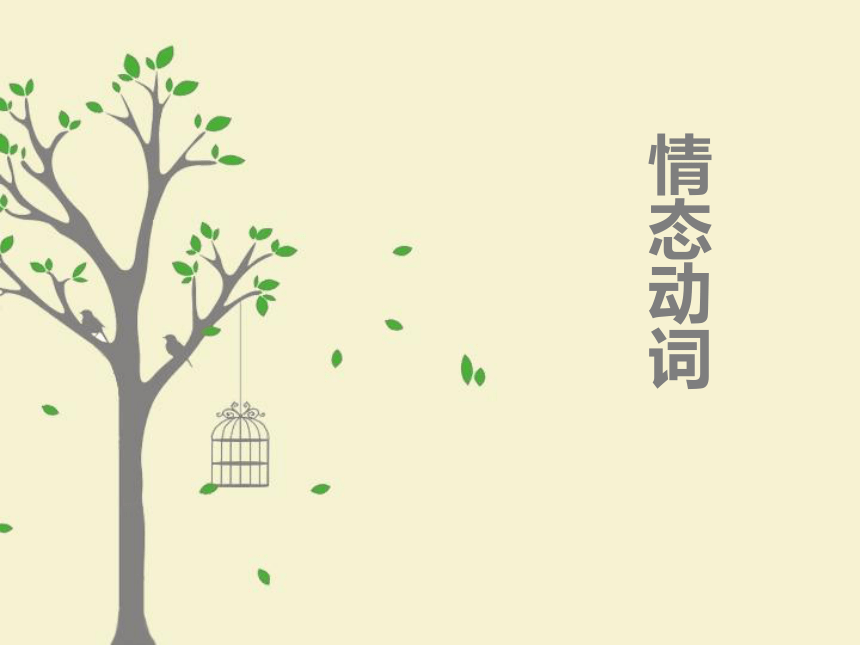
|
|
| 格式 | zip | ||
| 文件大小 | 195.8KB | ||
| 资源类型 | 教案 | ||
| 版本资源 | 通用版 | ||
| 科目 | 英语 | ||
| 更新时间 | 2018-11-04 06:01:40 | ||
图片预览

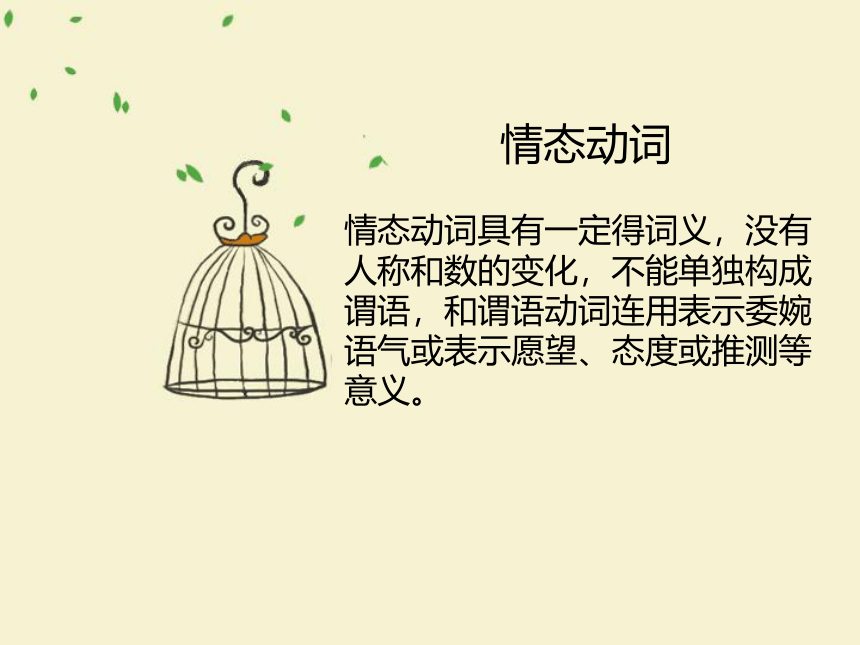
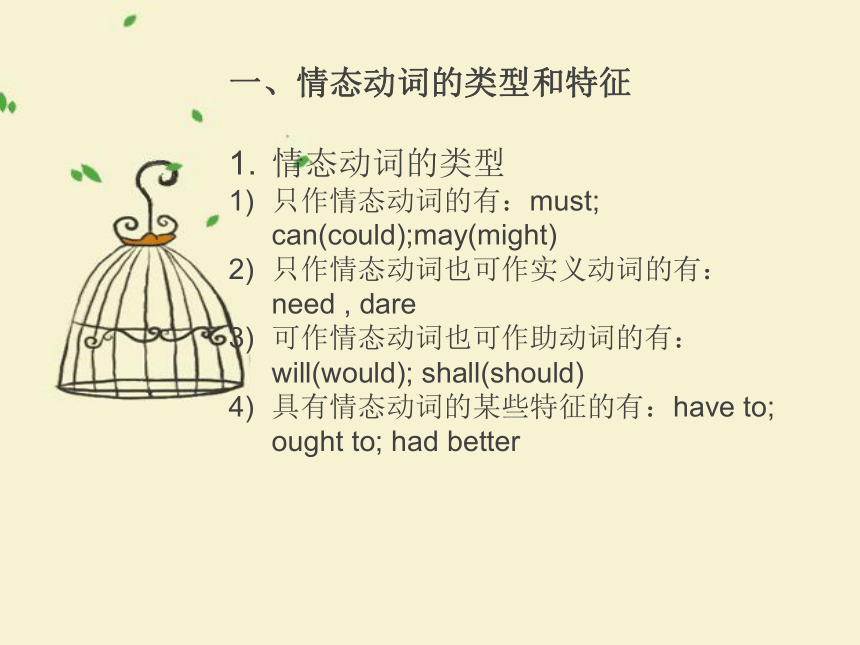
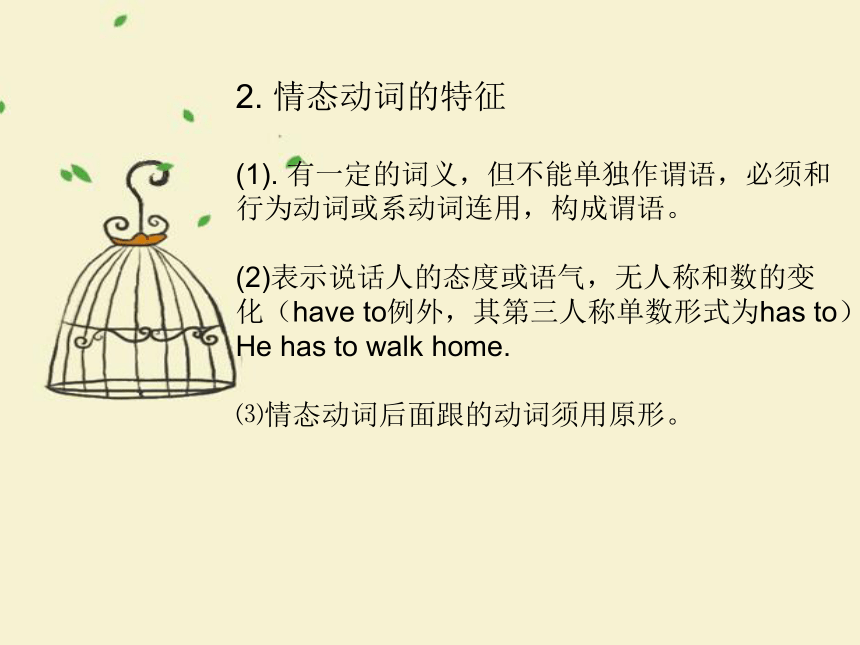
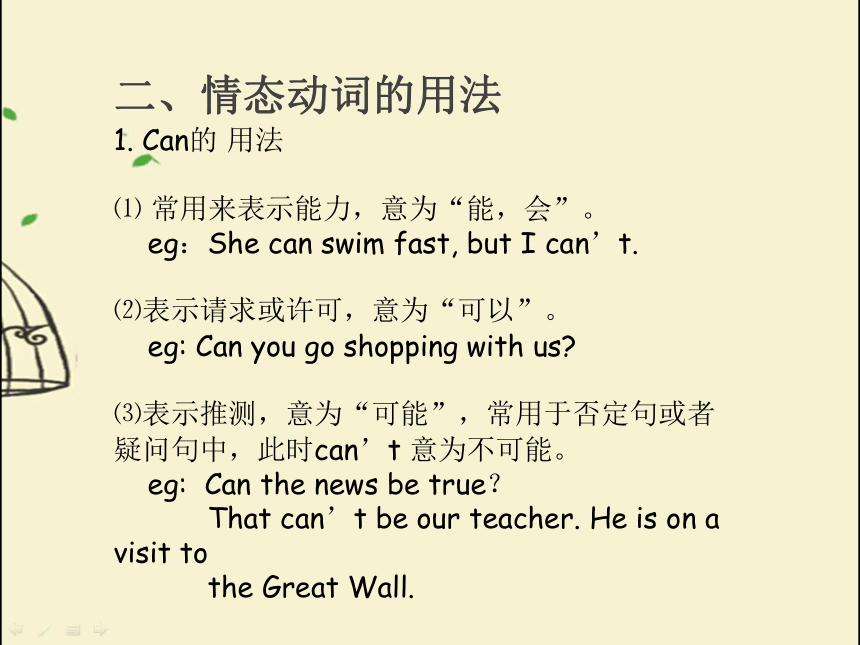
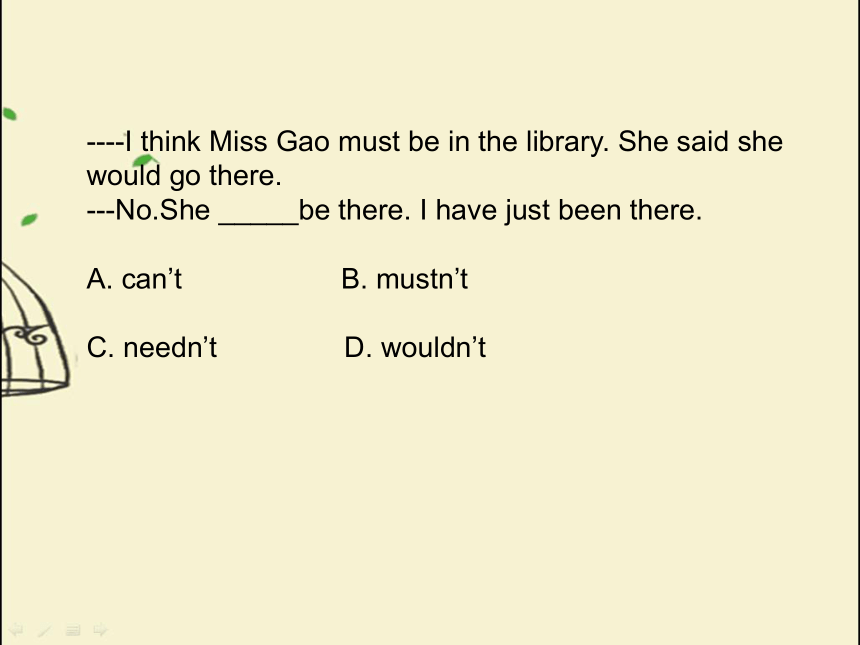
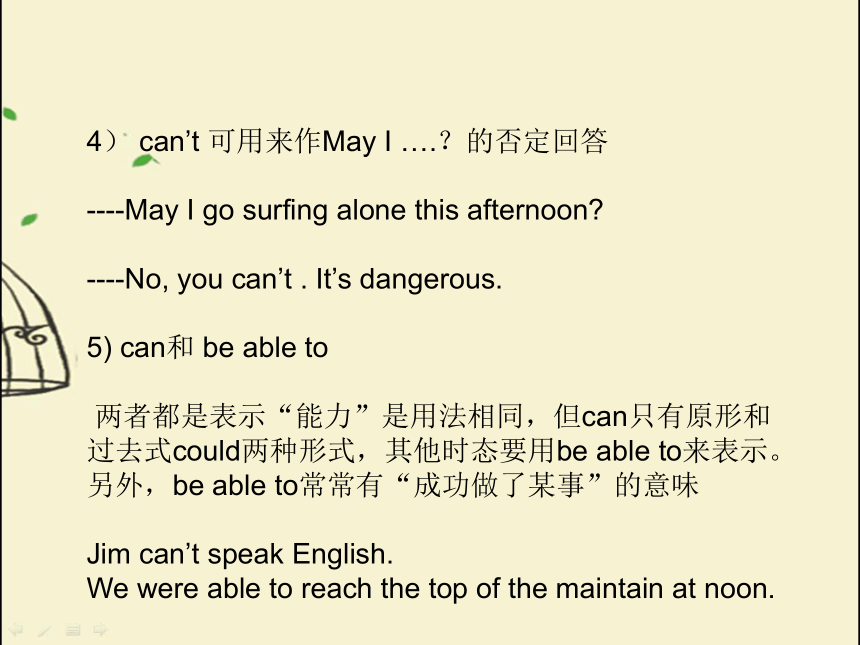
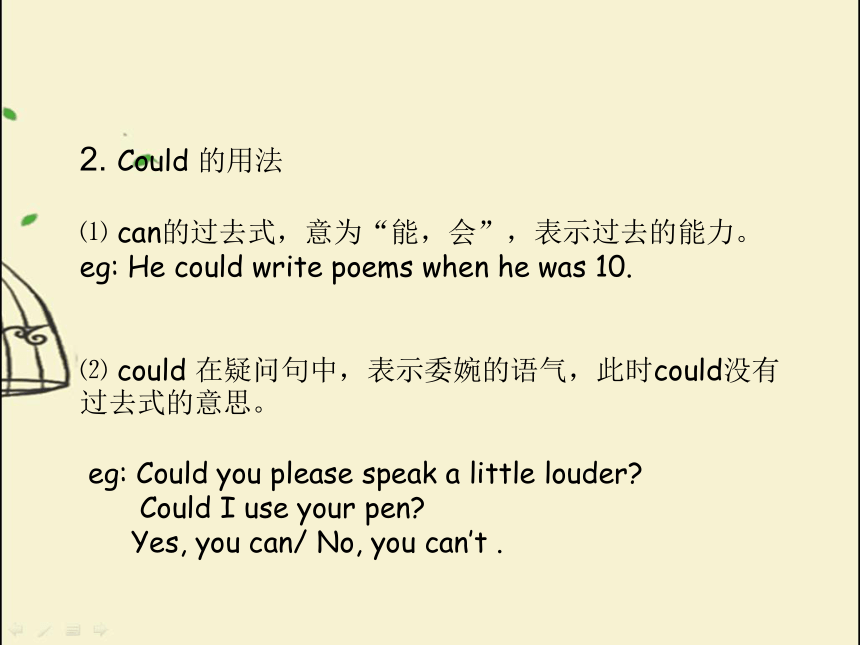
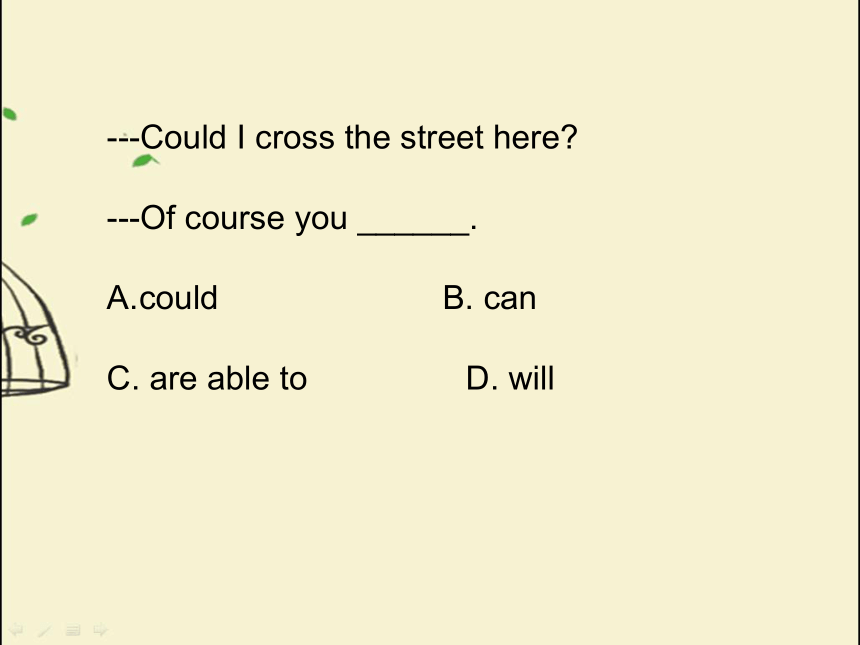
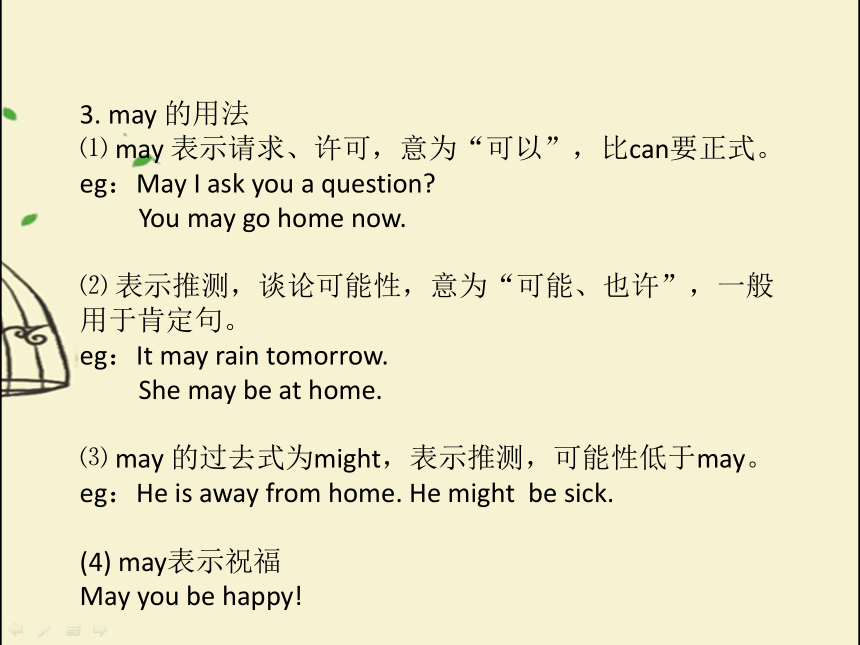
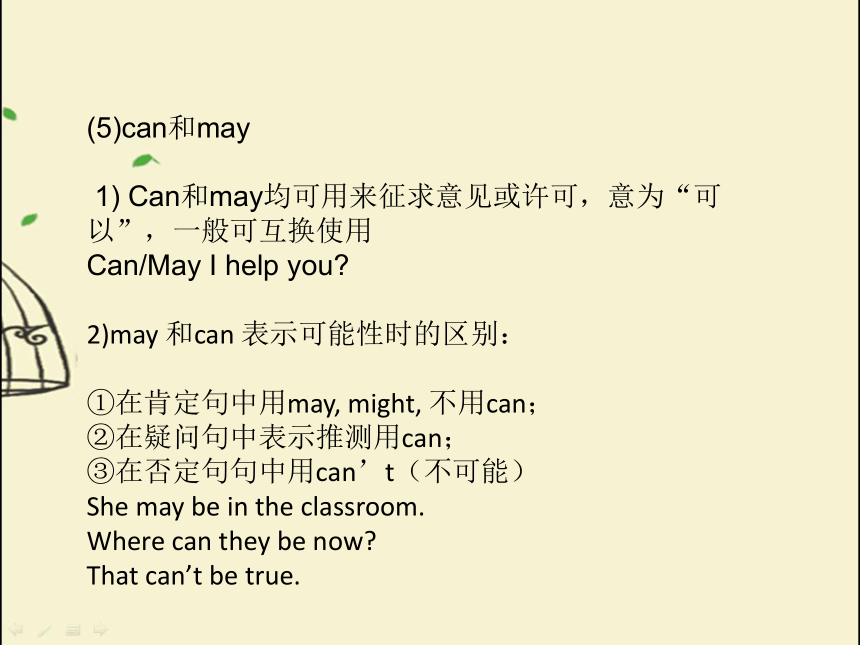
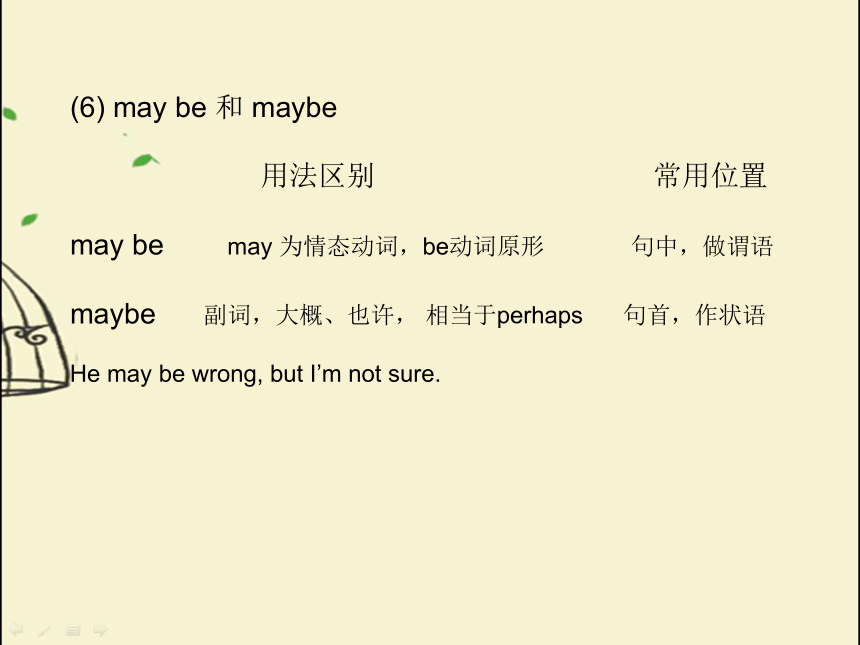
文档简介
课件39张PPT。情态动词情态动词
情态动词具有一定得词义,没有人称和数的变化,不能单独构成谓语,和谓语动词连用表示委婉语气或表示愿望、态度或推测等意义。一、情态动词的类型和特征
情态动词的类型
只作情态动词的有:must; can(could);may(might)
只作情态动词也可作实义动词的有:need , dare
可作情态动词也可作助动词的有:will(would); shall(should)
具有情态动词的某些特征的有:have to; ought to; had better2. 情态动词的特征
(1). 有一定的词义,但不能单独作谓语,必须和行为动词或系动词连用,构成谓语。
(2)表示说话人的态度或语气,无人称和数的变化(have to例外,其第三人称单数形式为has to)
He has to walk home.
⑶情态动词后面跟的动词须用原形。
二、情态动词的用法
1. Can的 用法
⑴ 常用来表示能力,意为“能,会”。
eg:She can swim fast, but I can’t.
⑵表示请求或许可,意为“可以”。
eg: Can you go shopping with us?
⑶表示推测,意为“可能”,常用于否定句或者疑问句中,此时can’t 意为不可能。
eg: Can the news be true?
That can’t be our teacher. He is on a visit to
the Great Wall.
----I think Miss Gao must be in the library. She said she would go there.
---No.She _____be there. I have just been there.
A. can’t B. mustn’t
C. needn’t D. wouldn’t 4) can’t 可用来作May I ….?的否定回答
----May I go surfing alone this afternoon?
----No, you can’t . It’s dangerous.
5) can和 be able to
两者都是表示“能力”是用法相同,但can只有原形和过去式could两种形式,其他时态要用be able to来表示。另外,be able to常常有“成功做了某事”的意味
Jim can’t speak English.
We were able to reach the top of the maintain at noon.
2. Could 的用法
⑴ can的过去式,意为“能,会”,表示过去的能力。
eg: He could write poems when he was 10.
⑵ could 在疑问句中,表示委婉的语气,此时could没有过去式的意思。
eg: Could you please speak a little louder?
Could I use your pen?
Yes, you can/ No, you can’t .
---Could I cross the street here?
---Of course you ______.
could B. can
C. are able to D. will3. may 的用法
⑴ may 表示请求、许可,意为“可以”,比can要正式。
eg:May I ask you a question?
You may go home now.
⑵ 表示推测,谈论可能性,意为“可能、也许”,一般用于肯定句。
eg:It may rain tomorrow.
She may be at home.
⑶ may 的过去式为might,表示推测,可能性低于may。
eg:He is away from home. He might be sick.
(4) may表示祝福
May you be happy!
(5)can和may
1) Can和may均可用来征求意见或许可,意为“可以”,一般可互换使用
Can/May I help you?
2)may 和can 表示可能性时的区别:
①在肯定句中用may, might, 不用can;
②在疑问句中表示推测用can;
③在否定句句中用can’t(不可能)
She may be in the classroom.
Where can they be now?
That can’t be true.
(6) may be 和 maybe
用法区别 常用位置
may be may 为情态动词,be动词原形 句中,做谓语
maybe 副词,大概、也许, 相当于perhaps 句首,作状语
He may be wrong, but I’m not sure.----Have you decided which senior high school to choose?
----Not yet. I ____go to Moonlight School.
A.must B.may
C.need D. should
----What will the weather be like tomorrow?
----It ____be rainy, cloudy or sunny. Who knows?
must B. might
C.shall D. should 情态动词练习 1讲解
1.----_____I have a look at your new watch?
----Yes, please.
May B. Need C. Dare D. Must
?
2.Tom is young but he _____fly a kite by himself.
may B. can C. need D.must
3.The work is too hard for him. He _____finish it on time.
can’t B. mustn’t
C. shouldn’t D. needn’t
?
4. The bookstore was open, so I ____buy the book.
can B. can’t
C. did can D. was able to5. Last year I ____drive. I used take the bus.
could B. couldn’t
C. should D. shouldn’t
?
6. ----Could we smoke here?
----I’m afraid you ____.
couldn’t B. can’t C. are able to D. will
7.----I hear you’ve got a new iPhone 4S.____ I have a look?
----Yes, certainly.
May B. Do C. Shall D. Should
?
8.----Where’s Lucy?
----I’m not sure. She _____in the school library.
maybe B. must be C. may be D. will be
9.----Where is Tom?
----_____he is at home. He didn’t feel well yesterday.
May be B. Maybe C. May
?
10.----______ I swim here?
---- I’m sorry. Children ____swim alone here
Must; can’t B. May; must
Can; mustn’t D. Can’t; can
4. Must 的用法
⑴must表示“一定要,必须”。否定形式是mustn’t,表示
“禁止,不许可”。
eg:You must stay here until I came back.
You mustn’t park your car in front of the entrance.
⑵ 对must引导的疑问句,肯定回答为must,否定回答为
needn’t或者don’t have to。
eg:----Must I finish my homework now?
----No, you needn’t.
⑶ must 常常指有根据的,比较有把握的推测,意为
“一定是,准是”,这种用法只能用于肯定句当中。
eg:The light is on. He must be at home now.
当must表示肯定判断、推测的时候,其反意疑问句要用实际问句的助动词来构成。
eg:She must have finish writing, hasn’t she?
⑷ must 和have to
①must侧重于个人意志和主观上的必要,意为“必须,应
该”。
eg:I know I must study hard.
②have to 侧重于客观上的必要,意为“不得不”。它有一
般现在时第三人称单数形式has to 和过去形式had to。
eg:My brother was very ill, so I had to call the
doctor at midnight.
③have to的否定形式是don’t have to, 相当于needn’t, 意为“不必”;mustn’t 表示“禁止,不允许”.
(5) can’t 和 mustn’t
表否定推测时应用can’t, mustn’t 意为“禁止,不允许”,不用来表推测,在肯定句中用must表推测,意为“一定”
---- Mom, must I clean my room now?
---- No, you ____.You can do it tomorrow.
can’t B. needn’t
C. mustn’t D. shouldn’t 5.need 的用法
⑴ need表示“需要,必须”,主要用于否定句和疑问句当中,否定形式为needn’t,意为“没有必要,不必”。用need提问时,肯定回答是must,否定回答为needn’t.
eg:---Need I stay here any longer?
⑵need可作实义动词,此时还有人称,数和时态的变化,后面多接动词不定时。
eg:I need to do it right now.
He needs to learn more about the girl.
注意: 对need 的词性判断常为难点,need后加to do说明need为实义动词,用助动词提问或否定;need后加doing表示被动意义;若need 后加do的动词原形,则need为情态动词
You needn’t see him, but I must.
You don’t need to come if you feel sick.(6). dare 表示 “敢于”, 用作情态动词时,无人称变化,只用于否定句、疑问句和条件句
Mary dare not touch the snake.
用于实义动词时,要注意人称和时态的变化,后面跟不定式
I have never dared to tell him about it.
注意:dare作实义动词时,其疑问句或否定句后面的不定式符号常省略。
He didn’t dare (to) disobey.You ____ swim in this part of the lake. It’s dangerous.
mustn’t B. needn’t
C. won’t D. may not
I enjoy the party very much, but I ____ go home. It’s too late.
A . have to B. may
C. mustn’t D. should’t 6. shall, should, will, would的用法
⑴ shall常用于疑问句当中,表示征求对方的意见(多用于第一、三人称),用在第一人称或第三人称的疑问句中
eg:shall we go out for a walk?
Shall he come at once?
一般回答: Yes, please./ All right./ No, thank you.
?⑵Shall用于第二、第三人称,表示说话人给对方命令、警告、允诺或威胁。
eg: You shall fail if you don't work harder. (警告)
He shall have the book when I finish reading. (允诺)
He shall be punished. (威胁)
⑶should意为“应该”。可表示劝告、建议、义务、责任等。
eg:We should protect the environment.
⑷ will表示主语的决心或意愿;也可表请求或询问,用于第二人称。
eg:I will never do that again.
I will help you if I’m free this afternoon.
Will you pass me the book?
⑸will表示习惯、请求,固有性质等。
eg: Everyday he will sit here hour after hour doing nothing.(习惯)
Will you help me with my English?(请求)
7. had better的用法
had better 意味“最好”,没有人称的变化,后接不带to的不定式,其否定形式为had better not.
eg: We had better go now.
You had better not give the book to him.
---- How was the youth club last night, Mark?
----It was great fun. You ______have come.
Must B. can
C. should D. may
You look tired now. You _______stay at home and have a rest.
had to B. had better
C. would like to D. would ratherPS: 在英语中,我们可以用其他多种方式提出我们的建议或征求对方意见。
(1).用“Let's do...”来提出建议。
e.g. Let's go for a walk after supper.
(2).用“What/How about...?”来提出建议;about后接名词或动词ing形式。
e.g. What about/How about a drink?
What about/How about taking Tom with us?
(3).用“Why not...?”来提出建议,表示“何不……”not面后接动词原形。“Why not...?”实际上是“Why don't you/we...?”的简略形式。
e.g. Why not meet at the school gate at eight?
Why don't we stay here another day?
(4).用“Would you like...?”来提出建议,意思是“你想要……吗?”Would you like后可接名词或不定式。如: Would you like a cup of tea?
Yes, please. No, thank you.
Would you like to go and see her?
Yes, I’d like to. No, thank you
“去游泳好吗?”
Shall we go for a swim?
Let's go for a swim,shall we?
What about/How about going swimming?
Why not go for a swim?
Would you like to go for a swim? will
will在there be句型中的形式及其句式变换。将有
由于“一般将来时”的结构可以用“will+动词原形”来表示, 所以there be句型的一般将来时的形式就是there will be。(一定不能说there will have)
There are many students in our school.
→There will be many students in our school. 含有情态动词的疑问句的回答
对may引出的问句,可以有下列回答方式:
Yes,you may. Yes, of course.
Yes, certainly. Sure .
No, you mustn’t. No, you can’t.
2.对must引出的疑问句,回答方式为:
Yes, … must. No,… needn’t/ don’t have to.
3.could在疑问句中,表示委婉的语气,此时could没有过去式的意思。
e.g.
—Could I use your pen?
---- Yes, you can./No, you can’t.
4. shall引出的疑问句用于第一人称或第三人称中,表示征求对方意见或客气的请求。其回答方式有以下几种:
Yes, please. All right. No, thank you.
5. would you…的回答方式有以下几种:
Yes, I will. (No, I won’t.) Sure . (I’m sorry , I can’t.) All right/ OK/ With pleasure.
Certainly. (No, thank you .) Yes, please.
Would you like to go shopping with me?
Yes, I’d like to./ No, thanks(thank you).
Would you like some water?
Yes, please./No, thanks(thank you)
—Would you do me a favour and pass on my thanks to Lily?
—________.
A. That’s right B. With pleasure
C. It doesn’t matter D. No trouble
情态动词具有一定得词义,没有人称和数的变化,不能单独构成谓语,和谓语动词连用表示委婉语气或表示愿望、态度或推测等意义。一、情态动词的类型和特征
情态动词的类型
只作情态动词的有:must; can(could);may(might)
只作情态动词也可作实义动词的有:need , dare
可作情态动词也可作助动词的有:will(would); shall(should)
具有情态动词的某些特征的有:have to; ought to; had better2. 情态动词的特征
(1). 有一定的词义,但不能单独作谓语,必须和行为动词或系动词连用,构成谓语。
(2)表示说话人的态度或语气,无人称和数的变化(have to例外,其第三人称单数形式为has to)
He has to walk home.
⑶情态动词后面跟的动词须用原形。
二、情态动词的用法
1. Can的 用法
⑴ 常用来表示能力,意为“能,会”。
eg:She can swim fast, but I can’t.
⑵表示请求或许可,意为“可以”。
eg: Can you go shopping with us?
⑶表示推测,意为“可能”,常用于否定句或者疑问句中,此时can’t 意为不可能。
eg: Can the news be true?
That can’t be our teacher. He is on a visit to
the Great Wall.
----I think Miss Gao must be in the library. She said she would go there.
---No.She _____be there. I have just been there.
A. can’t B. mustn’t
C. needn’t D. wouldn’t 4) can’t 可用来作May I ….?的否定回答
----May I go surfing alone this afternoon?
----No, you can’t . It’s dangerous.
5) can和 be able to
两者都是表示“能力”是用法相同,但can只有原形和过去式could两种形式,其他时态要用be able to来表示。另外,be able to常常有“成功做了某事”的意味
Jim can’t speak English.
We were able to reach the top of the maintain at noon.
2. Could 的用法
⑴ can的过去式,意为“能,会”,表示过去的能力。
eg: He could write poems when he was 10.
⑵ could 在疑问句中,表示委婉的语气,此时could没有过去式的意思。
eg: Could you please speak a little louder?
Could I use your pen?
Yes, you can/ No, you can’t .
---Could I cross the street here?
---Of course you ______.
could B. can
C. are able to D. will3. may 的用法
⑴ may 表示请求、许可,意为“可以”,比can要正式。
eg:May I ask you a question?
You may go home now.
⑵ 表示推测,谈论可能性,意为“可能、也许”,一般用于肯定句。
eg:It may rain tomorrow.
She may be at home.
⑶ may 的过去式为might,表示推测,可能性低于may。
eg:He is away from home. He might be sick.
(4) may表示祝福
May you be happy!
(5)can和may
1) Can和may均可用来征求意见或许可,意为“可以”,一般可互换使用
Can/May I help you?
2)may 和can 表示可能性时的区别:
①在肯定句中用may, might, 不用can;
②在疑问句中表示推测用can;
③在否定句句中用can’t(不可能)
She may be in the classroom.
Where can they be now?
That can’t be true.
(6) may be 和 maybe
用法区别 常用位置
may be may 为情态动词,be动词原形 句中,做谓语
maybe 副词,大概、也许, 相当于perhaps 句首,作状语
He may be wrong, but I’m not sure.----Have you decided which senior high school to choose?
----Not yet. I ____go to Moonlight School.
A.must B.may
C.need D. should
----What will the weather be like tomorrow?
----It ____be rainy, cloudy or sunny. Who knows?
must B. might
C.shall D. should 情态动词练习 1讲解
1.----_____I have a look at your new watch?
----Yes, please.
May B. Need C. Dare D. Must
?
2.Tom is young but he _____fly a kite by himself.
may B. can C. need D.must
3.The work is too hard for him. He _____finish it on time.
can’t B. mustn’t
C. shouldn’t D. needn’t
?
4. The bookstore was open, so I ____buy the book.
can B. can’t
C. did can D. was able to5. Last year I ____drive. I used take the bus.
could B. couldn’t
C. should D. shouldn’t
?
6. ----Could we smoke here?
----I’m afraid you ____.
couldn’t B. can’t C. are able to D. will
7.----I hear you’ve got a new iPhone 4S.____ I have a look?
----Yes, certainly.
May B. Do C. Shall D. Should
?
8.----Where’s Lucy?
----I’m not sure. She _____in the school library.
maybe B. must be C. may be D. will be
9.----Where is Tom?
----_____he is at home. He didn’t feel well yesterday.
May be B. Maybe C. May
?
10.----______ I swim here?
---- I’m sorry. Children ____swim alone here
Must; can’t B. May; must
Can; mustn’t D. Can’t; can
4. Must 的用法
⑴must表示“一定要,必须”。否定形式是mustn’t,表示
“禁止,不许可”。
eg:You must stay here until I came back.
You mustn’t park your car in front of the entrance.
⑵ 对must引导的疑问句,肯定回答为must,否定回答为
needn’t或者don’t have to。
eg:----Must I finish my homework now?
----No, you needn’t.
⑶ must 常常指有根据的,比较有把握的推测,意为
“一定是,准是”,这种用法只能用于肯定句当中。
eg:The light is on. He must be at home now.
当must表示肯定判断、推测的时候,其反意疑问句要用实际问句的助动词来构成。
eg:She must have finish writing, hasn’t she?
⑷ must 和have to
①must侧重于个人意志和主观上的必要,意为“必须,应
该”。
eg:I know I must study hard.
②have to 侧重于客观上的必要,意为“不得不”。它有一
般现在时第三人称单数形式has to 和过去形式had to。
eg:My brother was very ill, so I had to call the
doctor at midnight.
③have to的否定形式是don’t have to, 相当于needn’t, 意为“不必”;mustn’t 表示“禁止,不允许”.
(5) can’t 和 mustn’t
表否定推测时应用can’t, mustn’t 意为“禁止,不允许”,不用来表推测,在肯定句中用must表推测,意为“一定”
---- Mom, must I clean my room now?
---- No, you ____.You can do it tomorrow.
can’t B. needn’t
C. mustn’t D. shouldn’t 5.need 的用法
⑴ need表示“需要,必须”,主要用于否定句和疑问句当中,否定形式为needn’t,意为“没有必要,不必”。用need提问时,肯定回答是must,否定回答为needn’t.
eg:---Need I stay here any longer?
⑵need可作实义动词,此时还有人称,数和时态的变化,后面多接动词不定时。
eg:I need to do it right now.
He needs to learn more about the girl.
注意: 对need 的词性判断常为难点,need后加to do说明need为实义动词,用助动词提问或否定;need后加doing表示被动意义;若need 后加do的动词原形,则need为情态动词
You needn’t see him, but I must.
You don’t need to come if you feel sick.(6). dare 表示 “敢于”, 用作情态动词时,无人称变化,只用于否定句、疑问句和条件句
Mary dare not touch the snake.
用于实义动词时,要注意人称和时态的变化,后面跟不定式
I have never dared to tell him about it.
注意:dare作实义动词时,其疑问句或否定句后面的不定式符号常省略。
He didn’t dare (to) disobey.You ____ swim in this part of the lake. It’s dangerous.
mustn’t B. needn’t
C. won’t D. may not
I enjoy the party very much, but I ____ go home. It’s too late.
A . have to B. may
C. mustn’t D. should’t 6. shall, should, will, would的用法
⑴ shall常用于疑问句当中,表示征求对方的意见(多用于第一、三人称),用在第一人称或第三人称的疑问句中
eg:shall we go out for a walk?
Shall he come at once?
一般回答: Yes, please./ All right./ No, thank you.
?⑵Shall用于第二、第三人称,表示说话人给对方命令、警告、允诺或威胁。
eg: You shall fail if you don't work harder. (警告)
He shall have the book when I finish reading. (允诺)
He shall be punished. (威胁)
⑶should意为“应该”。可表示劝告、建议、义务、责任等。
eg:We should protect the environment.
⑷ will表示主语的决心或意愿;也可表请求或询问,用于第二人称。
eg:I will never do that again.
I will help you if I’m free this afternoon.
Will you pass me the book?
⑸will表示习惯、请求,固有性质等。
eg: Everyday he will sit here hour after hour doing nothing.(习惯)
Will you help me with my English?(请求)
7. had better的用法
had better 意味“最好”,没有人称的变化,后接不带to的不定式,其否定形式为had better not.
eg: We had better go now.
You had better not give the book to him.
---- How was the youth club last night, Mark?
----It was great fun. You ______have come.
Must B. can
C. should D. may
You look tired now. You _______stay at home and have a rest.
had to B. had better
C. would like to D. would ratherPS: 在英语中,我们可以用其他多种方式提出我们的建议或征求对方意见。
(1).用“Let's do...”来提出建议。
e.g. Let's go for a walk after supper.
(2).用“What/How about...?”来提出建议;about后接名词或动词ing形式。
e.g. What about/How about a drink?
What about/How about taking Tom with us?
(3).用“Why not...?”来提出建议,表示“何不……”not面后接动词原形。“Why not...?”实际上是“Why don't you/we...?”的简略形式。
e.g. Why not meet at the school gate at eight?
Why don't we stay here another day?
(4).用“Would you like...?”来提出建议,意思是“你想要……吗?”Would you like后可接名词或不定式。如: Would you like a cup of tea?
Yes, please. No, thank you.
Would you like to go and see her?
Yes, I’d like to. No, thank you
“去游泳好吗?”
Shall we go for a swim?
Let's go for a swim,shall we?
What about/How about going swimming?
Why not go for a swim?
Would you like to go for a swim? will
will在there be句型中的形式及其句式变换。将有
由于“一般将来时”的结构可以用“will+动词原形”来表示, 所以there be句型的一般将来时的形式就是there will be。(一定不能说there will have)
There are many students in our school.
→There will be many students in our school. 含有情态动词的疑问句的回答
对may引出的问句,可以有下列回答方式:
Yes,you may. Yes, of course.
Yes, certainly. Sure .
No, you mustn’t. No, you can’t.
2.对must引出的疑问句,回答方式为:
Yes, … must. No,… needn’t/ don’t have to.
3.could在疑问句中,表示委婉的语气,此时could没有过去式的意思。
e.g.
—Could I use your pen?
---- Yes, you can./No, you can’t.
4. shall引出的疑问句用于第一人称或第三人称中,表示征求对方意见或客气的请求。其回答方式有以下几种:
Yes, please. All right. No, thank you.
5. would you…的回答方式有以下几种:
Yes, I will. (No, I won’t.) Sure . (I’m sorry , I can’t.) All right/ OK/ With pleasure.
Certainly. (No, thank you .) Yes, please.
Would you like to go shopping with me?
Yes, I’d like to./ No, thanks(thank you).
Would you like some water?
Yes, please./No, thanks(thank you)
—Would you do me a favour and pass on my thanks to Lily?
—________.
A. That’s right B. With pleasure
C. It doesn’t matter D. No trouble
同课章节目录
- 词法
- 名词
- 动词和动词短语
- 动词语态
- 动词时态
- 助动词和情态动词
- 非谓语动词
- 冠词
- 代词
- 数词和量词
- 形容词副词及其比较等级
- 介词和介词短语
- 连词和感叹词
- 构词法
- 相似、相近词比较
- 句法
- 陈述句
- 一般疑问句和否定疑问句
- 特殊疑问句及选择疑问句
- 反意疑问句
- 存在句(There be句型)
- 宾语从句
- 定语从句
- 状语从句
- 主谓一致问题
- 简单句
- 并列句
- 复合句
- 主谓一致
- 主、表语从句
- 名词性从句
- 直接引语和间接引语
- 虚拟语气
- 感叹句
- 强调句
- 倒装句
- 祈使句
- 句子的成分
- 句子的分类
- 题型专区
- 单项选择部分
- 易错题
- 完形填空
- 阅读理解
- 词汇练习
- 听说训练
- 句型转换
- 补全对话
- 短文改错
- 翻译
- 书面表达
- 任务型阅读
- 语法填空
- 其他资料
